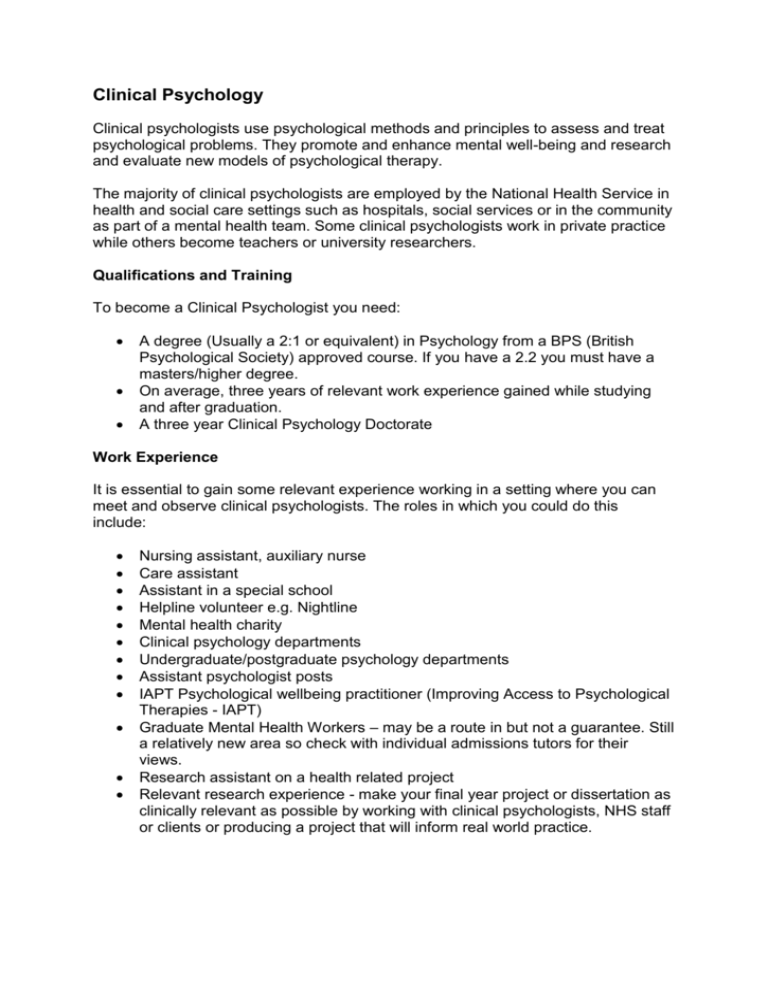Clinical Psychology Career Guide: Qualifications & Training
advertisement

Clinical Psychology Clinical psychologists use psychological methods and principles to assess and treat psychological problems. They promote and enhance mental well-being and research and evaluate new models of psychological therapy. The majority of clinical psychologists are employed by the National Health Service in health and social care settings such as hospitals, social services or in the community as part of a mental health team. Some clinical psychologists work in private practice while others become teachers or university researchers. Qualifications and Training To become a Clinical Psychologist you need: A degree (Usually a 2:1 or equivalent) in Psychology from a BPS (British Psychological Society) approved course. If you have a 2.2 you must have a masters/higher degree. On average, three years of relevant work experience gained while studying and after graduation. A three year Clinical Psychology Doctorate Work Experience It is essential to gain some relevant experience working in a setting where you can meet and observe clinical psychologists. The roles in which you could do this include: Nursing assistant, auxiliary nurse Care assistant Assistant in a special school Helpline volunteer e.g. Nightline Mental health charity Clinical psychology departments Undergraduate/postgraduate psychology departments Assistant psychologist posts IAPT Psychological wellbeing practitioner (Improving Access to Psychological Therapies - IAPT) Graduate Mental Health Workers – may be a route in but not a guarantee. Still a relatively new area so check with individual admissions tutors for their views. Research assistant on a health related project Relevant research experience - make your final year project or dissertation as clinically relevant as possible by working with clinical psychologists, NHS staff or clients or producing a project that will inform real world practice. Where to find work experience vacancies Check the Careers Service vacancy database, SAGE (www.ed.ac.uk/careers/sage), regularly for opportunities. Nursing and care posts may be advertised in the local press, on local council and health authority websites or in journals such as Community Care. The Scotsman, S1jobs, The Guardian and The Independent advertise NHS, social services and voluntary sector opportunities. Use the Looking for Work section of our website to find links to these publications and websites The BPS Psychologist Appointments advertises assistant psychologist jobs and similar posts. Be prepared to be proactive – don’t just wait for posts to be advertised. Make contact with your local pre-qualification group. These groups meet regularly, invite outside speakers and offer general support to psychology graduates preparing for clinical psychology training. A full list of regional groups can be found at: http://dcp-prequal.bps.org.uk/dcp-prequal/assistants.cfm Clinical Psychology: Useful Websites The Division of Clinical Psychology. The organisation devoted to furthering the development of clinical psychology both as a body of knowledge and skills and as a profession. www.bps.org.uk/dcp Psyclick. A resource for anyone seeking to train as a clinical psychologist, particularly in the UK. It should be of interest to psychology undergraduates and graduates, assistant psychologists. www.psyclick.org.uk Clearing House for Postgraduate Courses in Clinical Psychology. Provides a useful outline of what constitutes relevant experience. www.leeds.ac.uk/chpccp ClinPsy. The only website of its kind run by qualified Chartered Clinical Psychologists. Careers advice and information about entry to the profession plus a discussion forum. www.clinpsy.org.uk NHS jobs. Assistant psychologist posts are advertised on the NHS website. https://jobs.scot.nhs.uk www.jobs.nhs.uk Mental health jobs. A recruitment website dedicated to mental health www.mentalhealthjobs.co.uk Psychminded. News, courses and job vacancies for all who work in psychology, psychiatry and mental health. www.psychminded.co.uk PsychNet-UK. Mental health and psychology directory; information and action point on psychological sciences. www.psychnet-uk.com







